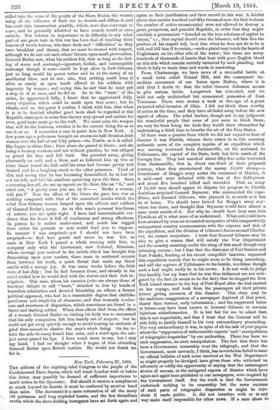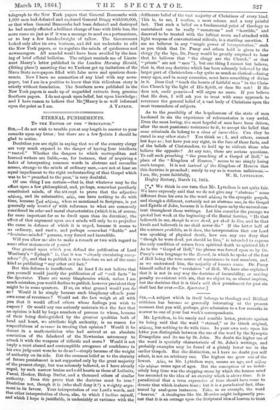New York, February 27, 1864. THE address of the expiring
rebel Congress to the people of the Confederated Slave States, which will reach London with or before this letter, may possibly be deemed of sufficient importance to merit notice in the Spectator. But should it receive a compliment so much beyond its deserts, it must be conferred by another hand than mine. The document is a mere reiteration of all the many old pretences, and long exploded boasts, and the few threadbare truths which the slaveholding insurgents have set forth again and again as their justification and their record in this war. A doleful plaint that certain hundred and fifty thousand men (for that is about the number of active secessionists) were not allowed to destroy a great, prosperous, and peaceful Republic, in order that they might establish a government " founded on the true relations of capital to labour," i.e., that capital should own the labourer, sell him like the produce of his unpaid toil, beat him when he does not do as he is told, and kill him if he resists,—such a plaint may touch the hearts of Englishmen on the other side of the water ; but there are many hundreds of thousands of hearts that beat with pure English blood on this side which remain entirely unmoved by such pleading, and think it folly to waste time and words in answering.
From Chattanooga we have news of a successful battle at a small town called Tunnel Hill, and the consequent im- mediate movement of our forces upon Dalton, where it is said (but I doubt it) that the rebel General Johnston means to give serious battle. Longstreet has retreated, and we hold not only undisturbed but unmenaced possession of East Tennessee. There were stories a week or two ago of a great projected rebel invasion of Ohio. I did not think them worthy of notice at the time, and they have all faded away before the new aspect of affairs. The rebel leaders, though not in my judgment. the wonderful people that some of you seem to think them, are very far from being the fools they would show themselves by undertaking a third time to breathe the air of the Free States. telegraph to the New York papers that General Buncombe with 1,000 men had defeated and captured General Bragg with100,000, or that when General Buncombe had been defeated and destroyed he had merely effected a brilliant change of base with little loss, the news came on just as if it was a message to send on a portmanteau, or to buy a few hundredweight of tallow. The Government looked only after its own business, and did net undertake to edit the New York papers, or to regulate the minds of quidnuncs and newsmongers. All scandal would have been avoided by the issu- ing of brief official bulletins. The subject reminds me of Lieute- nant Maury's letter published in the London Morning Herald, (fitting place !) asserting that we Yankees get up imitations of the Slave State newspapers filled with false news and spurious docu- ments. Now I have no connection of any kind with any news- paper, but I am in a position to know that this ridiculous story is utterly without foundation. The Southern news published in the New York papers is made up of ungarbled extracts from genuine Southern papers. I do not speak upon belief, but upon knowledge ; and I have reason to believe that Mr.:Maury is as well informed



































 Previous page
Previous page